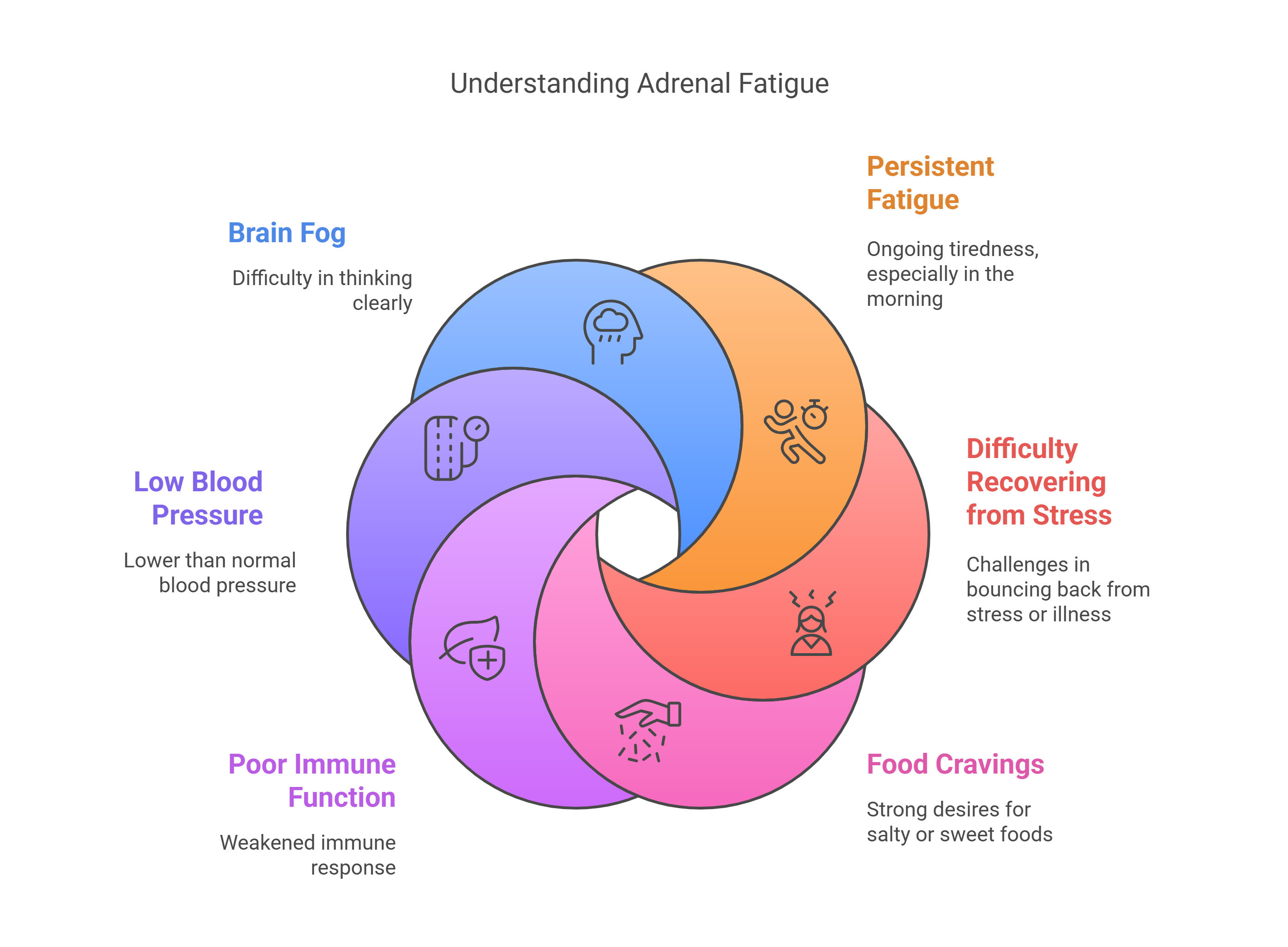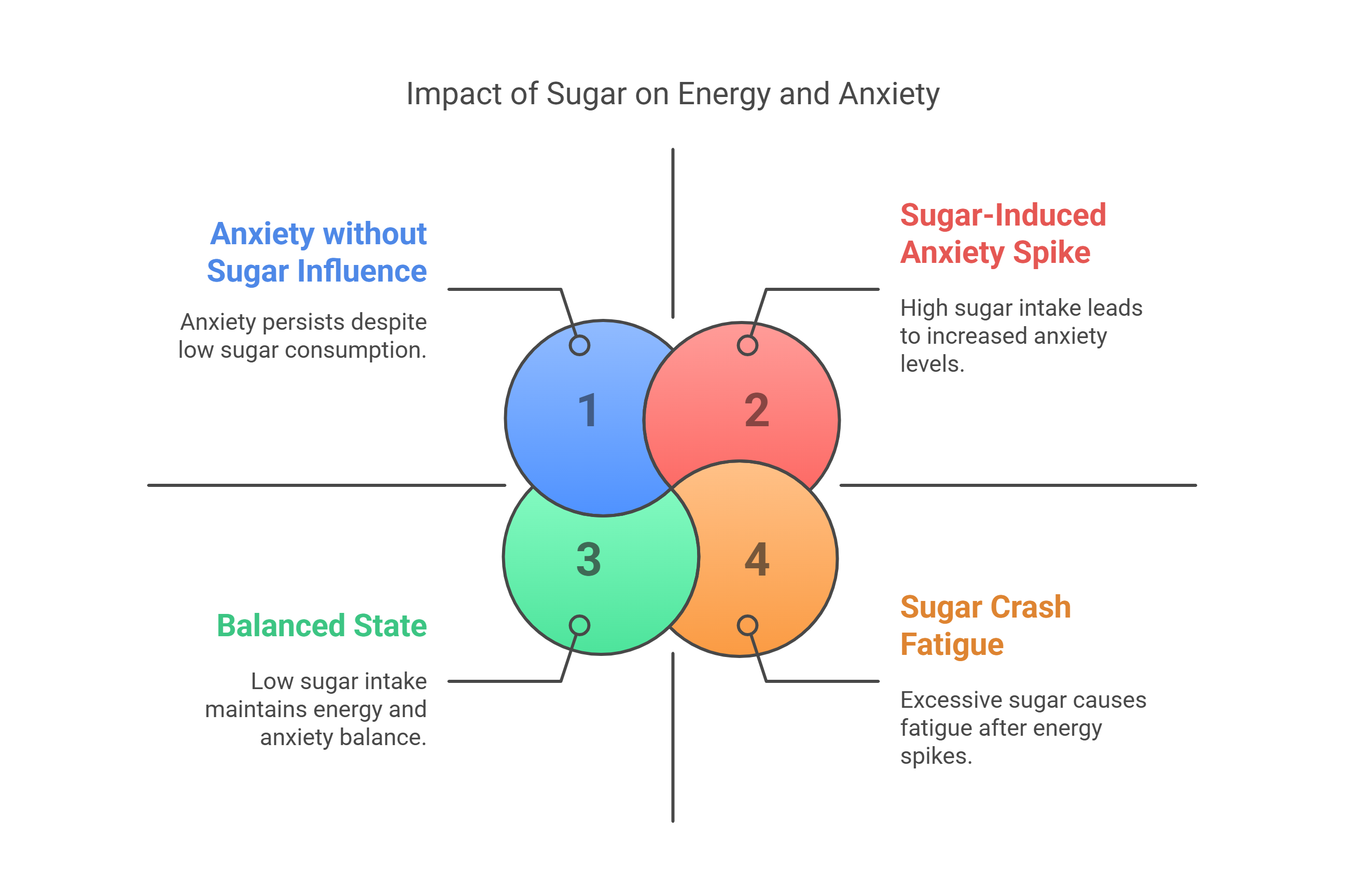
Adrenal Fatigue vs. Anxiety: Understanding the Key Differences and Finding Relief
Feeling constantly exhausted or on edge? You're not alone. Many people struggle to distinguish between what could be adrenal fatigue and what might be anxiety. These conditions share overlapping symptoms but have different underlying causes and treatments. Let's explore what sets them apart and how to address each condition effectively.
What Is Adrenal Fatigue?
Adrenal fatigue is a term used to describe a collection of symptoms that supposedly result from your adrenal glands functioning below their optimal level. These glands, located above your kidneys, produce hormones like cortisol that help regulate stress, metabolism, and immune function.
Proponents of the adrenal fatigue concept suggest that chronic stress can overwhelm these glands, leading to:
Persistent fatigue, especially in the morning
Difficulty recovering from stress or illness
Cravings for salty or sweet foods
Poor immune function
Low blood pressure
Brain fog
However, it's important to note that adrenal fatigue is not recognized as a medical diagnosis by most endocrinologists.
According to Dr. Lynnette Nieman, an endocrinology specialist at the National Institutes of Health,
"There's no scientific evidence to support the theory that long-term mental, emotional, or physical stress drains the adrenal glands and causes many common symptoms. Tests used to support the concept of adrenal fatigue are not based on scientific facts or supported by good scientific studies."

What Is Anxiety?
Anxiety, on the other hand, is a recognized mental health condition characterized by persistent worry, fear, or nervousness that can interfere with daily activities. Anxiety disorders are among the most common mental health conditions, affecting approximately 40 million adults in the United States.
Common symptoms of anxiety include:
Excessive worry or fear
Restlessness or feeling on edge
Rapid heart rate and breathing
Difficulty concentrating
Sleep disturbances
Muscle tension
Digestive issues
Dr. Elizabeth Hoge, a psychiatrist at the Center for Anxiety and Traumatic Stress Disorders at Massachusetts General Hospital, explains:
"Anxiety is a natural response to stress, but when it becomes chronic or excessive, it can develop into an anxiety disorder. Physical symptoms often accompany psychological symptoms, making it sometimes difficult to determine if what you're experiencing is strictly psychological or if there could be an underlying medical condition."
Key Differences Between Adrenal Fatigue and Anxiety
Origin and Medical Recognition
The most significant difference is that anxiety is a well-established medical condition with clear diagnostic criteria, while adrenal fatigue remains controversial in the medical community. Many doctors recognize that patients experience the symptoms associated with "adrenal fatigue," but attribute them to other conditions like depression, sleep disorders, or anxiety itself.
Symptom Focus
Adrenal fatigue symptoms center primarily around energy levels, with fatigue being the dominant complaint
Anxiety symptoms tend to revolve around heightened alertness, worry, and a sense of impending doom
Physical Responses
Adrenal fatigue is often associated with feeling "wired but tired" - exhausted but unable to rest properly
Anxiety typically creates a "fight or flight" response with increased heart rate, breathing, and muscle tension
When Sugar Enters the Picture
Interestingly, sugar consumption can significantly impact both conditions. High sugar intake can destabilize blood glucose levels, contributing to both fatigue and anxiety symptoms.
For those experiencing symptoms of either condition, reducing sugar intake may help. Sugar creates energy spikes followed by crashes, which can mimic or worsen adrenal fatigue symptoms. Similarly, sugar can trigger anxiety symptoms in some individuals.

Treatment Approaches
For Adrenal Fatigue-Like Symptoms:
Lifestyle modifications like improved sleep hygiene
Stress management techniques
Balanced nutrition with regular meals
Reduced caffeine and sugar intake
Gentle, regular exercise
For Anxiety:
Psychotherapy (particularly cognitive-behavioral therapy)
Mindfulness and meditation practices
Regular physical activity
Adequate sleep
Potential medication when appropriate
Dietary adjustments including reducing sugar and caffeine
When to Seek Professional Help
If you're experiencing persistent fatigue or anxiety, it's essential to consult with healthcare professionals. A primary care physician can help rule out medical conditions that might cause similar symptoms, such as thyroid disorders, anemia, or adrenal insufficiency.
For anxiety symptoms, mental health professionals can provide proper diagnosis and treatment plans. Remember that seeking help is a sign of strength, not weakness.
Summary
While adrenal fatigue isn't recognized by mainstream medicine, the symptoms people experience are very real and deserve attention. Whether your symptoms align more with what's described as adrenal fatigue or with anxiety, the good news is that many of the lifestyle changes that help one condition often benefit the other as well.
Focus on:
Maintaining a balanced diet low in refined sugars
Developing good sleep habits
Incorporating stress-reduction techniques into your daily routine
Engaging in regular, enjoyable physical activity
Seeking professional guidance when needed
Understanding the distinction between these conditions can help you communicate more effectively with healthcare providers and find the most appropriate path to feeling better. Remember that everyone's experience is unique, and a personalized approach to wellness is always best.
 Add Row
Add Row  Add
Add 




Write A Comment